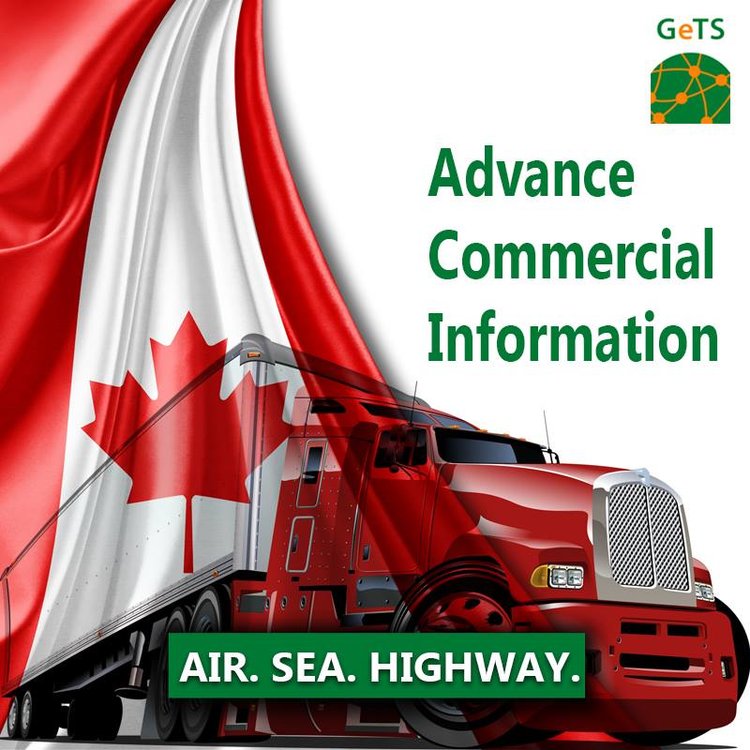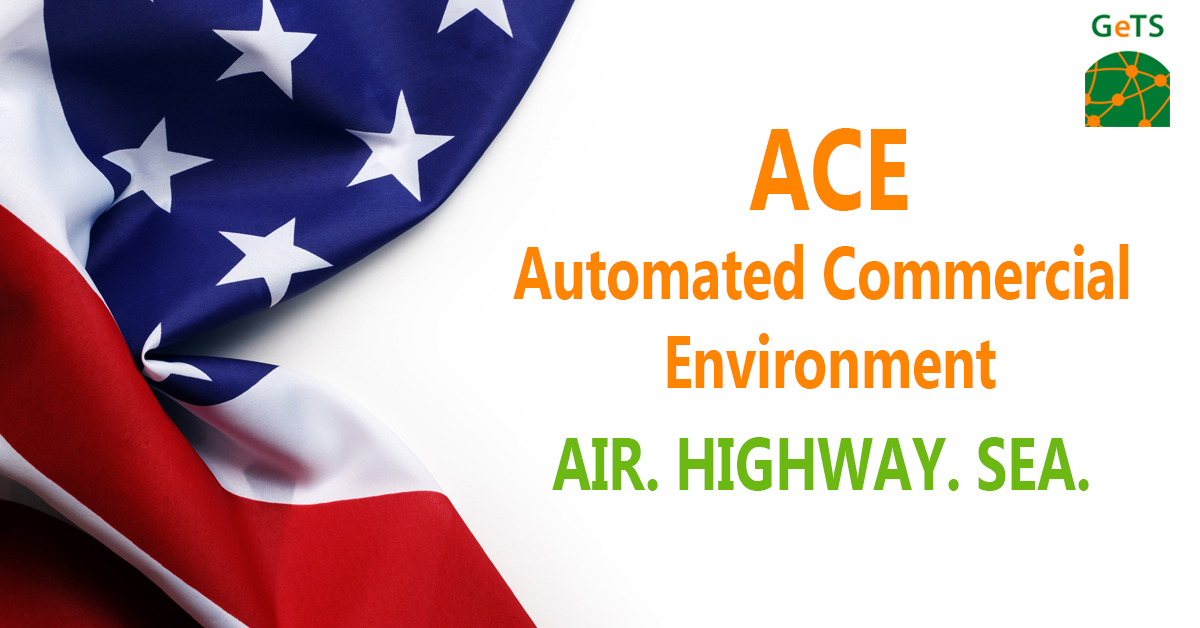Job Scam Alert:
This is to notify you that we have been alerted of job scams misusing the name of Global eTrade Services (GeTS). We would like to emphasize that there is no active, ongoing recruitment under the brand name of GeTS as we now operate under our parent company, CrimsonLogic. Please read the full disclaimer here.
- 29 Nov 2016
- Canada
- USA
- ACE ACI
- ACE ACI eManifest
- Shipment
- ACI
- ACE
- ACI eManifest
- Canada eManifest
- CBSA eManifest
- Advance Commercial Information
- ACE eManifest
- US eManifest
- CBP eManifest
- Automated Commercial Environment
- CBSA
- CBP
- Trade
- eManifest
- Border Crossing
Last Updated: Oct. 28, 2019 A shipment type, also called clearance type or release option, is the method of transportation used by carriers for goods or merchandise crossing the United States or Canada. The shipment type is used to obtain clearance from customs officials. The importer or broker usually selects the shipment type, and the carrier depends on the information provided by clients to select the appropriate ACE/ACI shipment type.
ACI eManifest Shipment Types
Canada Border Services Agency (CBSA) defines a shipment as a specified good or a collection of specified goods listed in one bill of lading, waybill or other similar document relating to the carriage of goods for transport between two or more persons.
Consolidated Shipment
A consolidated shipment is several separate shipments grouped together by a consolidator or freight forwarder. The consolidated shipment is shipped to an agent as one shipment and under one bill of lading (BoL) and reported to customs on one cargo control document with one shipper and one consignee.

Non-Consolidated Shipment
A non-consolidated or single shipment is a shipment that has not been grouped together. Single shipments require a pre-arrival electronic cargo document or pre-load in marine mode, depending on the type and origin of the goods.
PARS
Pre-Arrival Review System (PARS) is the most common shipment type for commercial goods entering Canada. The carrier sends pre-arrival cargo and conveyance data to the Canada Border Services Agency (CBSA) to obtain clearance.
In-Bond Shipment
An in-bond shipment allows for the inland movement of goods that have yet been pre-cleared by customs or released at the border. Only bonded highway carriers are entitled to use in-bound shipments. The shipment is considered in-bond when a driver arrives at the border with an A8A form and presents the shipment as in-bond on the ACI eManifest. CBSA will allow the shipment to cross the border and be delivered to a sufferance warehouse or a CBSA office to await release. The customs broker will file a formal entry so that the goods can be removed from the warehouse and delivered to the consignee.
Customs Self-Assessment (CSA)
CSA is a shipment type that allows goods imported by a CSA-approved importer and transported by a CSA-approved carrier to be cleared by the CBSA. To be eligible as a CSA shipment, the merchandise must be shipped from the U.S. or Mexico and must not require any kind of permit or license. Both the importer and carrier must be CSA-approved for the CSA shipment to be cleared. The driver of the conveyance must also be registered with the Commercial Driver Registration Program (CDRP) or the Free and Secure Trade (FAST) driver program.
Flying Truck
Flying Truck is a type of shipment that was originally destined to arrive by air and have already been declared on an air eManifest, but actually arrives at the border by truck or highway conveyance. The carrier needs to report the Flying Truck shipment on the eManifest by setting the flying truck exception code on the truck, trailer or container, depending on where the shipment was loaded.
Courier Low-Value Shipment (LVS)
Courier LVS is a type of shipment that has an estimated value of less than CAD$1,600 and must not be prohibited, controlled or regulated. The goods must be transported by an approved courier registered under the CBSA Courier LVS Program. To report a courier LVS, the carrier must set the LVS exception code on the truck, trailer or container, wherever the LVS was loaded.
A49
A49 is a type of shipment that allows for the release of production and service automotive goods arriving via highway carrier and destined for Chrysler, Ford Motor and General Motors of Canada. A49 is mainly used as an alternative to CSA shipments. Declaring goods as A49 allows carriers or drivers who are not CSA/FAST-approved to move automotive goods across the border very quickly. A49 shipments must be reported on the ACI eManifest as non-CSA.
Instruments of International Trade (IIT)
Instruments of International Trade (IIT) are shipments consisting of empty racks and cargo containers, reusable drums, skids, pallets, straps and similar products used to transport commercial goods internationally. To be classified as IIT, the shipment must not be entering Canada to be sold and must be covered under the Ottawa file or container bank.
E29B
E29B or Temporary Importation Bond shipments are goods that enter Canada temporarily on Form E29B Temporary Admission Permit. The importer or broker must complete the form and all necessary paperwork and provide a security deposit if applicable.
ATA Carnet
ATA Carnet is an international customs document that allows goods to be temporarily imported into Canada or the United States. Carnets are typically used for commercial samples or professional goods to be used in exhibitions. ATA Carnet shipments must not have consumable goods like agricultural items.
Orders in Council
Orders in Council allow for shipments covered under an Order in Council to be exempt from normal customs release processing.
Postal Shipments
Postal shipments cover mail moving from a foreign postal service to Canada Post.
Personal Goods
Personal goods contain non-commercial items transported by highway carriers.
ACE eManifest Shipment Types

PAPS
Pre-Arrival Processing System (PAPS) is the most common shipment type for commercial goods entering the U.S. by truck. PAPS is the counterpart of the Canadian PARS. It is designed to expedite the release of shipments while the U.S. Customs and Border Protection (CBP) is still processing each shipment through automated risking systems. PAPS is the default shipment type for most commercial goods; all goods transported by highway carriers must clear under PAPS unless they qualify for another shipment type. Carriers must prepare an ACE eManifest listing the same PAPS number for the shipment.
In-Bond Shipment
An in-bond shipment allows for the inland movement of goods that have yet been pre-cleared by customs or released at the border. In-bond shipments may be destined for another country and are often immediately exported. Only bonded highway carriers are entitled to use in-bound shipments.
Section 321
Section 321 is an informal entry that allows for the release of shipments valued at USD$800 or less. Section 321 shipments must not be one of several lots covered by a single order or contract. Section 321 shipments don’t have to be manifested unless the carrier has other shipments that are not under Section 321. In this case, all goods (including Section 321 shipments) must be declared in the ACE eManifest.
BRASS
BRASS or Border Release Advanced Screening and Selectivity are high-volume, highly-compliant cargo shipments that allow carriers to cross the border before the broker files a formal entry. BRASS shipments must include a C4 code (given by the importer to the carrier) that covers all goods being imported. The truck driver bearing the BRASS shipment must also be FAST-approved. BRASS shipments must be declared on an ACE eManifest.
Free of Duty
A Free of Duty shipment (CBP Form 7523) is an informal entry that allows for the release of shipments containing duty free goods and not exceeding USD$2,500 in value. The goods must not be subject to any quota or internal revenue tax. The importer or customs broker advises the carrier whether the shipment should be Free of Duty. Free of Duty Shipments are exempt from ACE eManifest filing requirements, but carriers may submit an eManifest for faster processing.
Returned American Products
Returned American Products (CBP Form 3311) is an informal entry allowing for the release of shipments with U.S. products that are being returned to the country. The goods must have been returned by the foreign buyer for credit and must not have been exempted from internal revenue tax when exported. Otherwise, the shipment is subject to duty.
Goods Astray
Goods Astray is an informal entry that allows for the release of goods exported from the U.S. and returned to the U.S. within 45 days as undeliverable. The goods must not have left the custody of the carrier or foreign customs service to qualify.
ACE/ACI Filing at the Border
When arriving at the border in the U.S or Canada, truck drivers must present a cover sheet to the customs officer. The cover sheet allows the customs officer to retrieve the manifest in their system and match the information. For northbound carriers, the cover sheet must have a barcoded conveyance reference number (trip number) OR a barcoded Cargo Control Number (CCN) and handwritten conveyance reference number OR a handwritten conveyance reference number on the cover sheet with a separate page showing the barcoded CCN. An example is an invoice with a PARS sticker. The customs officer will stamp only the cover sheet and not individual shipments. The carrier is responsible for keeping the stamped cover sheet as proof of report. After stamping, the carrier is free to go or may be referred to secondary for further processing.
Canada Border Services Agency ACE/ACI: How to Resolve Invalid Status of Request or Error Code 464 and T36
An “invalid status of request/cargo control number” or “CCN in history” response from CBSA means that the cargo control number has already been used previously. The carrier must assign a new CCN to the shipment and resubmit the form to CBSA. There is no need to contact the EDI hotline as the reject message is straightforward.
To learn more, please visit our ACI eManifest, ACE eManifest pages. You may also complete the short online form on our Contact Us page.
Related Pages:
CBP Entry Type 86 Clearance for eCommerce Shipments
What Importers Need to Know About Section 321 Entry Type 86
How to File ISF for your Inbound Cargo
Importer Security Filing (ISF)
ACE Ocean for eCommerce Shipments
New CBP Penalties for Cross Border Trucks
CBP Begins ISF-5 (Importer Security Filing) Enforcement
Electronic Manifest: ACE - ACI Integration
The Future of e-Commerce: Global e-Commerce Trends in 2019 and Beyond
What Is Section 321(CBP Shipment Type)?
ACE (Automated Commercial Environment)
Benefits that Enterprises Gain from Automated Commercial Environment US
What is SW - Single Window US?
Benefits of Using USA Single Window
Truck Section 321 eManifest Requirements from U.S. CBP
ACI Highway Canada eManifest FAQ
Canada eManifest: Highway Shipments Made Easy
ACI eManifest Phase III: Canada eManifest House Bill Data & Supplementary Cargo Reports
ACI housebill eManifest: Bill of Lading for Freight Forwarders
Contact GeTS today for more information on ACE/ACI Shipment!
CANADA
GeTS eTrade (Canada) Inc.
100 York Boulevard Suite 260
Richmond Hill,
Ontario, Canada L4B 1J8
+ 1-877-763-6887
Local North America
+ 1-905-763-6887
Fax: 1-905-763-2321
UNITED STATES OF AMERICA
Global eTrade Services, Inc.(U.S.)
19800 MacArthur Blvd. Suite 300
Irvine, California, U.S.A.
92612
+ 1-877-763-6887, (Sales, Support, Billing)
Local North America
+ 1-905-763-6887 (Sales, Support, Billing)
Fax: 1-905-763-2321
